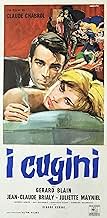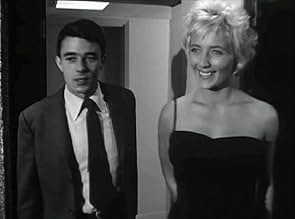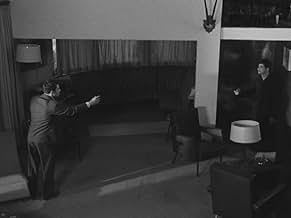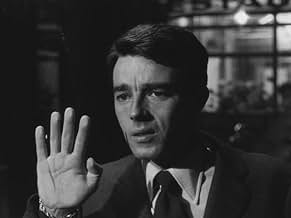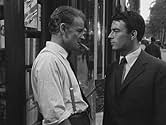Les cousins
- 1959
- Tous publics
- 1h 52min
NOTE IMDb
7,2/10
3,4 k
MA NOTE
Deux cousins partagent un appartement, mais une animosité s'installe entre eux à l'arrivée d'une femme.Deux cousins partagent un appartement, mais une animosité s'installe entre eux à l'arrivée d'une femme.Deux cousins partagent un appartement, mais une animosité s'installe entre eux à l'arrivée d'une femme.
- Réalisation
- Scénario
- Casting principal
- Récompenses
- 1 victoire au total
Avis à la une
Les Cousins is definitively part of the French New Wave of the late 1950s. Whilst slightly more polished than the films of his contemporaries (notably Godard and Truffaut), Chabrol's film bubbles with an insurgence of new cinematographic techniques and fresh acting talent. The sense of newness is reinforced by presence of so many young actors, dressed elegantly in tuxedos and evening dresses, but acting somewhat delinquently for the most part. The film appears almost like the christening party for the birth of a new era in French cinema.
Both the direction and photography are of a high calibre and capture very well the changing mood of the central character, Charles. The film starts cheerfully and optimistically with the young man's arrival in Paris. Like him, we are enchanted by the bright lights, the wide boulevards and the historic monuments. But then, little by little, the mood changes to ennui and disappointment when the shallowness of the Paris jet set is revealed. Finally, a much darker mood prevails as Charles' best efforts to succeed are brutally crushed by a combination of circumstances, partly of his own making but largely as a result of the hand of fate. This ability to alter the mood of the film so subtly and effectively is one of Chabrol's great skills as a director and is used to far greater effect in some of his subsequent thrillers.
Both of the two central characters, Charles and Paul, are played admirably by Gérard Blain and Jean-Claude Brialy. Blain manages to capture the innocence of the outsider and offers a sympathetic and memorable performance. Brialy seems to revel in his role as the extravagant city student, hosting his parties with the gusto of a true bon-vivant, whilst exhibiting a more complicated and sensitive persona in his conversations with the characters Charles and Florence.
Both actors were used by Chabrol in an earlier film, Le Beau Serge, which, in some ways, is the mirror image of Les Cousins. In Le Beau Serge, Brialy played a city boy who returns to his home in a provincial town where he met up wih a childhood friend played by Blain. Brialy's character was the outsider and ultimately he was destroyed by his alien surroundings. In Les Cousins, the situation is cleverly reversed. Here, Blain's character is a country boy who joins Brialy in the city of Paris. It is Blain's character who is now the outsider, and who is finally destroyed by his unfamiliar environment. It is interesting to watch the two films back-to-back, to note the similarities and compare the differences. Both films seem to side with the outsider and condemn the society that rejects him, although it is perhaps disappointing that, in both cases, that the outsider is destroyed without having any significant impact on the society that crushed him. At least, in Le Beau Serge, the victim's fate was sealed by an altruistic desire to do some good for the community that rejected him, whereas in Les Cousins, the victim brought his destruction on himself by trying to attack the society he felt so repulsive.
Les Cousins lacks the emotional intensity of Le Beau Serge and appears in some places a little too stage-managed. (The ending is particularly stagy, but it works perfectly to the film's advantage.) On the plus side, Les Cousins benefits from a far superior musical score, a more interesting set of characters, and some impressive location filming in Paris. It is an engaging and accessible film which still appears fresh and vibrant.
Both the direction and photography are of a high calibre and capture very well the changing mood of the central character, Charles. The film starts cheerfully and optimistically with the young man's arrival in Paris. Like him, we are enchanted by the bright lights, the wide boulevards and the historic monuments. But then, little by little, the mood changes to ennui and disappointment when the shallowness of the Paris jet set is revealed. Finally, a much darker mood prevails as Charles' best efforts to succeed are brutally crushed by a combination of circumstances, partly of his own making but largely as a result of the hand of fate. This ability to alter the mood of the film so subtly and effectively is one of Chabrol's great skills as a director and is used to far greater effect in some of his subsequent thrillers.
Both of the two central characters, Charles and Paul, are played admirably by Gérard Blain and Jean-Claude Brialy. Blain manages to capture the innocence of the outsider and offers a sympathetic and memorable performance. Brialy seems to revel in his role as the extravagant city student, hosting his parties with the gusto of a true bon-vivant, whilst exhibiting a more complicated and sensitive persona in his conversations with the characters Charles and Florence.
Both actors were used by Chabrol in an earlier film, Le Beau Serge, which, in some ways, is the mirror image of Les Cousins. In Le Beau Serge, Brialy played a city boy who returns to his home in a provincial town where he met up wih a childhood friend played by Blain. Brialy's character was the outsider and ultimately he was destroyed by his alien surroundings. In Les Cousins, the situation is cleverly reversed. Here, Blain's character is a country boy who joins Brialy in the city of Paris. It is Blain's character who is now the outsider, and who is finally destroyed by his unfamiliar environment. It is interesting to watch the two films back-to-back, to note the similarities and compare the differences. Both films seem to side with the outsider and condemn the society that rejects him, although it is perhaps disappointing that, in both cases, that the outsider is destroyed without having any significant impact on the society that crushed him. At least, in Le Beau Serge, the victim's fate was sealed by an altruistic desire to do some good for the community that rejected him, whereas in Les Cousins, the victim brought his destruction on himself by trying to attack the society he felt so repulsive.
Les Cousins lacks the emotional intensity of Le Beau Serge and appears in some places a little too stage-managed. (The ending is particularly stagy, but it works perfectly to the film's advantage.) On the plus side, Les Cousins benefits from a far superior musical score, a more interesting set of characters, and some impressive location filming in Paris. It is an engaging and accessible film which still appears fresh and vibrant.
Although it's Chabrol's second effort (the first one being "le beau serge" featuring the same actors),this one is closer to Chabrol-as -we -know-him.The detective ending and the first steps in the bourgeois world of Brialy character herald Chabrol 's heyday (which begins with "les biches" ,encompasses such works as "la femme infidèle","que la bête meure" "le boucher" "la rupture" "juste avant la nuit " and ends with" les noces rouges";that's not to say all the movies were great during that period :"doctor Popaul" and "la decade prodigieuse" can be forgotten";that does not mean there were no great works after "wedding in blood" (les noces)either as testify such memorable works as "Violette NOzières","Une affaire de femmes" or "l'enfer".But in France the 1967-1973 era is generally regarded as Chabrol's peak ,with "le boucher" ,his towering achievement. So we enter the bourgeois world with Brialy's character,a bon vivant as we say in France,with parents (whom we never see)who provide him money and a comfortable flat .He is a student,but we never see him studying,girls and pleasures taking the best of him. In direct contrast with him,enters Blain,his provincial cousin.He comes from a much more modest background,his parents (whom we never see either)had certainly to struggle hard to send him to the Latin Quarter. So from the beginning ,the incommunicability is total.Blain is a grind,and if sometimes he accepts to follow his life-lover cousin in not-so-intellectual places in Paris,he knows he shall not disappoint his old parents.Brialy's kind of life is bewildering for a young lad like Blain:a scene is particularly strange,baroque,and even threatening: some fascination for Nazism from Brialy and his clique during a strange party(it's 1959,and German occupation is not that much far behind after all). Chabrol has ready begun his bourgeoisie wholesale massacre:Brialy is the prototype of the bourgeois student,selfish and smug,self-confident and apolitical (And however,1959,it's Algerian war!Young French are sent to do the dirty job).Apolitical,such is also Blain's case,but with more excuses :after all,when you're poor .. In his autobiography "le ruisseau des singes" ,Brialy told that Chabrol(and the producer) had planned an happy end with the two cousins running across the fields,reconciled.Both endings were filmed,and finally the two actors urged Chabrol to renounce this silly conclusion. Hence an almost Hitchcockian ending,Hitchcock whose influence will grow over the years in Chabrol's work.
Chabrol's second feature. I haven't seen his first, Le beau Serge, but this is the most French New Wave film I've seen from Chabrol. As such, it's by far my favorite. I like several of his films, but I do find even my favorites a little dry. This one is just gorgeous and it's quite a lot of fun throughout. Gerard Blain plays a provincial who is moving to Paris to go to college. He moves in with his cousin (Jean-Claude Brialy), who is himself a student. Brialy is a total party animal, spending all his free time drinking with friends and none of it studying. The two get along at first, but then a woman (Juliette Mayniel) comes between them. The film is kind of a precursor to Jules et Jim.
Charles is a young provincial coming up to Paris to study law. He shares his cousin Paul's flat. Paul is a kind of decadent boy, a disillusioned pleasure-seeker, always dragging along with other idles, while Charles is a plodding, naive and honest man. He fell in love with Florence, one of Paul's acquaintances. But how will Paul react to that attempt to build a real love relationship?
Of the so-called French New Wave directors, Claude Chabrol has been called possibly the most mainstream (though less celebrated than Truffaut or Godard). We could also say he has a remarkable amount of stamina. "Les Cousins" was at the beginning of his career, and for decades he kept making great movies, including the notable "Madame Bovary" in 1991... and still kept going.
I love this film's blend of decadence and death. A simple man, with studies on his mind, is exposed to some bizarre scenes of sensuality, violence, crime, and even Nazi elements (in 1950s France?). This is what it is like if you take two opposing elements and allow them to spin out of control.
Of the so-called French New Wave directors, Claude Chabrol has been called possibly the most mainstream (though less celebrated than Truffaut or Godard). We could also say he has a remarkable amount of stamina. "Les Cousins" was at the beginning of his career, and for decades he kept making great movies, including the notable "Madame Bovary" in 1991... and still kept going.
I love this film's blend of decadence and death. A simple man, with studies on his mind, is exposed to some bizarre scenes of sensuality, violence, crime, and even Nazi elements (in 1950s France?). This is what it is like if you take two opposing elements and allow them to spin out of control.
The 13th film I saw of Claude Chabrol. The least I liked. I understand the meaning and the message of the film, but practically nothing captivated me: Neither the characters (nor Charles's own character captivated me) nor the rhythm of the film (a very long sequence in which we get to know Paul's friends, who swim and the way the "bourgeoisie" is presented to us, there are immense films that "capture" this social class in a much more skilful and humorous way, nor the message of the film, which I find to be inadequate and unlikely in the form how it is performed. I liked Chabrol's film the previous year, his first one, "le beau serge", curiously with the same double protagonist. I can not give this "les cousins" more than 6/10.
Le saviez-vous
- AnecdotesTwo endings were filmed, one optimistic (the reconciliation between the two cousins), which was discarded, and the other pessimistic, which was finally chosen.
- Citations
Le libraire: Read Dostoyevsky. He addresses all your concerns.
- ConnexionsFeatured in Fejezetek a film történetéböl: A francia új hullám (1990)
- Bandes originales40e Symphonie en Sol Majeur (Koechel 550) 1er movement
Music by Wolfgang Amadeus Mozart (as W.A. Mozart)
Performed by London Symphony Orchestra (as Orchestre Symphonique de Londres)
Conducted by Josef Krips (as Joseph Krips)
Disque DECCA
Meilleurs choix
Connectez-vous pour évaluer et suivre la liste de favoris afin de recevoir des recommandations personnalisées
- How long is The Cousins?Alimenté par Alexa
Détails
Box-office
- Budget
- 6 000 000 F (estimé)
- Durée1 heure 52 minutes
- Couleur
- Mixage
- Rapport de forme
- 1.37 : 1
Contribuer à cette page
Suggérer une modification ou ajouter du contenu manquant

Lacune principale
By what name was Les cousins (1959) officially released in Canada in English?
Répondre
